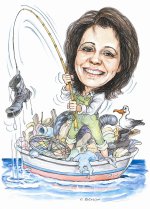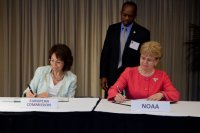Speech at the exhibition "Wherefrom, whereto – The Greeks from Hohenlohe" at the Committee of the Regions, Brussels , 16 March 2010
Dear Mrs Gebhardt,
Dear Members of the European Committee of the Regions,
Dear Members of the European Parliament,
Dear colleagues and friends,
Thank you very much for giving me the opportunity to be here with you this evening. Let me say just a few words:
In the 1960s Germany was in great need of workers in order to manage the required industrial production and economic growth. The availabilities in Germany itself were not sufficient so a lot of companies in Germany invited guest-workers from foreign countries to come and work in their factories and companies. 50 years ago this happened as well in the German region of Hohenlohe which is subject to this exhibition. After the signing of the German-Greek agreement on the exchange of workers, trains from Greece arrived with thousands of guest-workers, motivated to work in Germany for a certain period of time.
The Greeks were working hard. They became a respected part of the German society, and most of them stayed in Germany for good. Of course emigration is not in all cases very easy. The pictures address especially some of the individual destinies behind it. Nevertheless, one can say that the Greeks integrated themselves very well. The open Greek character, the thirst for life, the good humour and the culture of food are some of the trademarks of the Greek soul, which started being made known to the German people.
The exhibition shows portraits of Greek guest-workers and their employers (of which – I believe - one of them is with us tonight). It also shows photos and samples as well as impressions of the landscape of Hohenlohe which is quite different from the landscapes in Greece. Today, the socio-economic situation is not comparable to the one 50 years ago. Due to high unemployment rates and a changing society, today immigration causes political as well as economic concern. The difficulties lie in the fact that today countries like France, Germany and also Greece now accept immigrants but are facing at the same time structural, long-term unemployment of their own citizens. This situation leads indeed to difficulties in the integration process.
There is no integration without mutual understanding and tolerance. Only by trying to understand the others, there can be coexistence. And coexistence will finally lead to integration.
In this context, I believe it is important to change the way of thinking. We should see immigration and integration of migrants as something positive. As something we can benefit from and which enriches our lives. Regulated immigration has the potential to be a strategic tool in the Union's growth and competitiveness agenda. We should refocus on innovative policies for making migrants valued contributors to European societies.
Integration is usually not visible as such. It is an imperceptible process which only shows when it fails. However, with this exhibition the successful integration of thousands of Greek migrant-workers in Germany was made visible.
Thank you very much.

 Follow me on Twitter
Follow me on Twitter
 Follow me on YouTube
Follow me on YouTube










